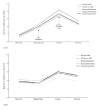Attitudes and actions of asthma patients on regular maintenance therapy: the INSPIRE study
- PMID: 16772035
- PMCID: PMC1483837
- DOI: 10.1186/1471-2466-6-13
Attitudes and actions of asthma patients on regular maintenance therapy: the INSPIRE study
Abstract
Background: This study examined the attitudes and actions of 3415 physician-recruited adults aged > or = 16 years with asthma in eleven countries who were prescribed regular maintenance therapy with inhaled corticosteroids or inhaled corticosteroids plus long-acting beta2-agonists.
Methods: Structured interviews were conducted to assess medication use, asthma control, and patients' ability to recognise and self-manage worsening asthma.
Results: Despite being prescribed regular maintenance therapy, 74% of patients used short-acting beta2-agonists daily and 51% were classified by the Asthma Control Questionnaire as having uncontrolled asthma. Even patients with well-controlled asthma reported an average of 6 worsenings/year. The mean period from the onset to the peak symptoms of a worsening was 5.1 days. Although most patients recognised the early signs of worsenings, the most common response was to increase short-acting beta2-agonist use; inhaled corticosteroids were increased to a lesser extent at the peak of a worsening.
Conclusion: Previous studies of this nature have also reported considerable patient morbidity, but in those studies approximately three-quarters of patients were not receiving regular maintenance therapy and not all had a physician-confirmed diagnosis of asthma. This study shows that patients with asthma receiving regular maintenance therapy still have high levels of inadequately controlled asthma. The study also shows that patients recognise deteriorating asthma control and adjust their medication during episodes of worsening. However, they often adjust treatment in an inappropriate manner, which represents a window of missed opportunity.
Figures




References
-
- Masoli M, Fabian D, Holt S, Beasley R. Global burden of asthma http://www.ginasthma.com/ReportItem.asp?l1=2&l2=2&intId=94 Accessed: 21 June 2005. - PubMed
-
- Global Initiative for Asthma . Global Strategy for Asthma Management and Prevention (updated 2004) Bethesda MD: National Institutes of Health; NIH Publication No. 02-3659; 2004.
-
- National Asthma Education and Prevention Program . Guidelines for the Diagnosis and Management of Asthma Expert Panel Report 2. Bethesda, MD: National Institutes of Health; NHI Publication No. 97-4051; 1997.
-
- British Thoracic Society British guidelines on the management of asthma. Thorax. 2003;58:1–94.
Publication types
MeSH terms
Substances
LinkOut - more resources
Full Text Sources
Other Literature Sources
Medical

